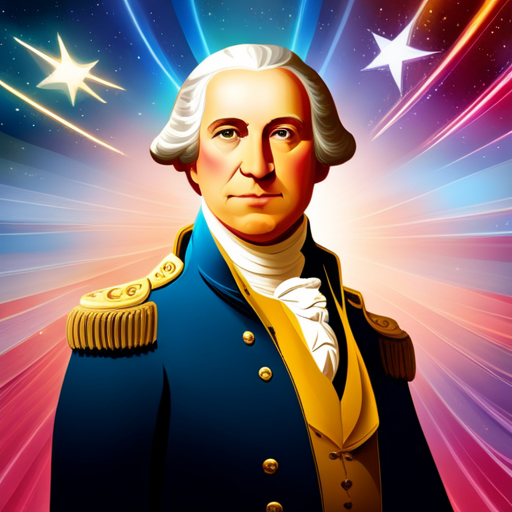Autobiography of George Washington
My Early Life
I was born on February 22, 1732, in Westmoreland County, Virginia. My father, Augustine Washington, was a prosperous planter, and my mother, Mary Ball Washington, instilled in me a disciplined character, teaching me the virtues of humility, industry, and responsibility.
I didn’t have the privilege of attending school in England like my elder brothers, who died in their youth, so I was homeschooled. I cultivated a keen interest in mathematics, learning the science of surveying, which became useful later in life.
My father’s death when I was 11 years old introduced me to the harsh reality of life, leaving me as the ward of my older half-brother, Lawrence. From him, I learned the elements of gentlemen’s pursuits, including fencing, horsemanship, and dance. He also instilled in me an appreciation for the military arts.
First Foray into Military Life
In my mid-teens, I had the opportunity to serve as an officer in the Virginia militia. The year 1754 saw the beginning of what was later known as the French and Indian War. I was 22 and held the rank of lieutenant colonel when I led an expedition to the Ohio River Valley. This experience in the frontier was my introduction to combat, and despite the defeat at Fort Necessity, I learned the value of preparation, strategic planning, and respect for the enemy.
Marriage and Mount Vernon
My dear brother Lawrence, who had been like a father to me, died in 1752. His death deeply saddened me, but it also led to a significant development in my life. I inherited Lawrence’s estate, Mount Vernon, which I expanded over the years into a sizable plantation.
In 1759, at the age of 27, I married Martha Dandridge Custis, a charming and wealthy widow with two young children. Our union, though childless, was filled with warmth and mutual respect. Martha’s children, Jacky and Patsy, were like my own. I tried to impart in them the same virtues my mother had taught me.
Revolutionary War and Leadership
The years leading up to 1775 were filled with increasing tension between the British Parliament and the American colonies. Our objection to the excessive taxes and our demand for representation were met with deaf ears in England.
In 1775, the Second Continental Congress convened in Philadelphia, and I was appointed Commander-in-Chief of the Continental Army. Despite our ragtag army’s lack of resources and formal military training, our resolve was undeterred.
Through years of hardship, bitter winters, and countless battles, we managed to keep the spirit of revolution alive. The tide turned in our favor with the Battle of Saratoga in 1777, and in 1781, we achieved a decisive victory in the Battle of Yorktown.
A New Nation
After the war, I yearned for a simple life at Mount Vernon, but destiny had other plans. The Constitutional Convention in 1787 saw me unanimously chosen as the presiding officer. The Constitution that was drafted then became the foundation of our new republic.
In 1789, much to my surprise, I was elected the first President of the United States. Reluctantly, I accepted the responsibility, aware of the magnitude of the office and the expectations of a nation.
The eight years I spent as President were some of the most challenging yet rewarding years of my life. We laid the foundation for a strong federal government, established a national bank, and set precedents that have endured to this day.
Final Years and Legacy
After two terms, I was more than ready to retire. I yearned for the tranquility of my home in Mount Vernon, to manage my plantation, and spend the rest of my days in quietude.
On December 14, 1799, I bid farewell to this world, content in the knowledge that I had done my best to serve my country. My legacy, I hope, is one of service, sacrifice, and dedication to the principles of liberty and democratic governance. I trust future generations to guard these values and carry forward the vision we held for our new nation.
Throughout my life, I held onto the belief that virtue, integrity, and a sense of duty are paramount to a life well-lived. It is my hope that my journey inspires others to strive for these noble ideals in their own lives.
George Washington Books and Audio Books on Amazon.
Show more +
